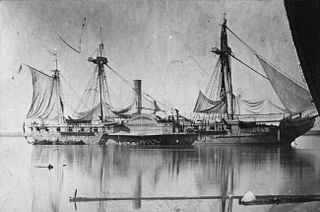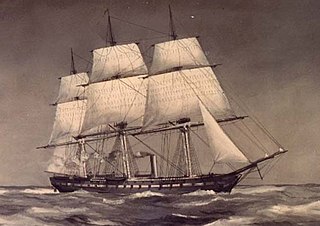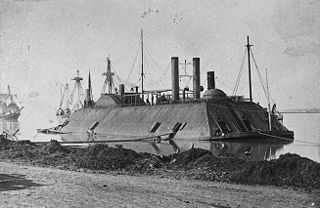John Pearson may refer to:

Melancthon Brooks Woolsey was an officer in the United States Navy during and after the American Civil War. He was commodore of the South Atlantic Station in the 1870s.

USS Onondaga was an ironclad river monitor built for the Union Navy during the American Civil War. Commissioned in 1864, the ship spent her entire active career with the James River Flotilla covering the water approaches to the Confederate States capital of Richmond, Virginia, although her only notable engagement was the Battle of Trent's Reach. After the war, she was purchased by France where she served as a coastal defense ship in the French Navy.

CSSSelma was a steamship in the Confederate States Navy during the American Civil War. She served in the Confederate Navy first as Florida, and later as Selma. She was captured by the Union Navy steamer USS Metacomet during the Battle of Mobile Bay. She served as USS Selma until the end of the war, when she was decommissioned and sold for use as a merchant ship.

Melancton Smith was a New York delegate to the Continental Congress. His first name is sometimes spelled "Melancthon"; it derives from Philip Melanchthon, the leader in the Reformation.

USS Mississippi, a paddle frigate, was the first ship of the United States Navy to bear that name. She was named for the Mississippi River. Her sister ship was Missouri. Her keel was laid down by the Philadelphia Navy Yard in 1839; built under the personal supervision of Commodore Matthew Perry. She was commissioned on 22 December 1841, with Captain W. D. Salter in command and launched several weeks later.

USS Wabash was a steam screw frigate of the United States Navy that served during the American Civil War. She was based on the same plans as Colorado. Post-war she continued to serve her country in European operations and eventually served as a barracks ship in Boston, Massachusetts, and was sold in 1912.

The Treatise on the Power and Primacy of the Pope (1537), The Tractate for short, is the seventh Lutheran credal document of the Book of Concord. Philip Melanchthon, its author, completed it on February 17, 1537 during the assembly of princes and theologians in Smalcald.
Alexander S. Crawford was a sailor in the United States Navy who served in the American Civil War. He received the Medal of Honor for his actions during the war.
Isaac Smith may refer to:

The Battle of Albemarle Sound was an inconclusive naval battle fought in May 1864 along the coast of North Carolina during the American Civil War. Three Confederate warships, including an ironclad, engaged eight Union gunboats. The action ended indecisively due to the sunset.

Melancton Smith was a United States Navy officer who served during the Seminole Wars and the American Civil War.
USS Massachusetts (1860) was a large steamer acquired by the U.S. Navy prior to the American Civil War.
A large contingent of African Americans served in the American Civil War. 186,097 black men joined the Union Army: 7,122 officers, and 178,975 enlisted soldiers. Approximately 20,000 black sailors served in the Union Navy and formed a large percentage of many ships' crews. Later in the War, many regiments were recruited and organized as the United States Colored Troops, which reinforced the Northern side substantially in the last two years. Both Northern Free Negro and Southern runaway slaves joined the fight. Throughout the course of the war, black soldiers served in forty major battles and hundreds of more minor skirmishes; sixteen African Americans received the Medal of Honor.
Melancthon Smith Wade was a businessman, horticulturist, and soldier from the state of Ohio who served as a general in the Union Army during the early part of the American Civil War.

The Augsburg Confession, also known as the Augustan Confession or the Augustana from its Latin name, Confessio Augustana, is the primary confession of faith of the Lutheran Church and one of the most important documents of the Protestant Reformation. The Augsburg Confession was written in both German and Latin and was presented by a number of German rulers and free-cities at the Diet of Augsburg on 25 June 1530.

John Carson Febiger was a rear admiral of the United States Navy who served with the Union Navy during the American Civil War.

The Battle of Lucas Bend took place on January 11, 1862 near Lucas Bend, four miles north of Columbus on Mississippi River in Kentucky as it lay at the time of the American Civil War. In the network of the Mississippi, Tennessee and Ohio rivers, the Union river gunboats under Flag Officer Andrew Hull Foote and General Ulysses S. Grant sought to infiltrate and attack the Confederate positions in Tennessee. On the day of the battle, the Union ironclads Essex and St Louis, transporting troops down the Mississippi in fog, engaged the Confederate cotton clad warships General Polk, Ivy and Jackson and the gun platform New Orleans at a curve known as Lucas Bend in Kentucky. The Essex, under Commander William D. Porter, and the St Louis forced the Confederate ships to fall back after an hour of skirmishing during which the Union commander was wounded. They retreated to the safety of a nearby Confederate battery at Columbus, where the Union vessels could not follow.
Melancthon Smith was a Colonel in the Confederate States Army during the American Civil War. A graduate of the United States Military Academy, he served with the artillery of the Army of Tennessee in the Western Theater. After the war he became a journalist.
This page is based on this
Wikipedia article Text is available under the
CC BY-SA 4.0 license; additional terms may apply.
Images, videos and audio are available under their respective licenses.










